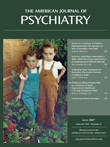Efficacy of Duloxetine on Cognition, Depression, and Pain in Elderly Patients With Major Depressive Disorder: An 8-Week, Double-Blind, Placebo-Controlled Trial
Abstract
Objective: This study compared the effects of duloxetine, 60 mg/day, versus placebo on cognition, depression, and pain in elderly patients with recurrent major depressive disorder. Method: Patients were randomly assigned (2:1) to duloxetine, 60 mg/day (N=207), or placebo (N=104) for 8 weeks in a double-blind study. The primary outcome measure was a prespecified composite cognitive score composed of four individual tests. Secondary measures included the Geriatric Depression Scale, the Hamilton Depression Rating Scale, the Visual Analogue Scale assessing pain, and standard safety and tolerability assessments. Results: Patients had a median age of 72 years (range=65–90). Duloxetine demonstrated significantly greater improvement in the composite cognitive score versus placebo (least-squares mean change from baseline to endpoint: 1.95 versus 0.76), driven by improved verbal learning and memory. Duloxetine treatment showed significantly greater baseline-to-endpoint reductions in both Hamilton depression scale (–6.49 versus –3.72) and Geriatric Depression Scale (–4.07 versus –1.34) total scores compared with placebo. Hamilton depression scale response (37.3% versus 18.6%) and remission (27.4% versus 14.7%) rates at endpoint were significantly higher for duloxetine than for placebo. Duloxetine significantly improved Visual Analogue Scale scores for back pain and time in pain while awake versus placebo. Significantly fewer patients receiving duloxetine withdrew from the study because of lack of efficacy (2.9% versus 9.6%); the incidences of discontinuation due to adverse events were similar for duloxetine and placebo (9.7% versus 8.7%). Conclusions: Duloxetine improved cognition, depression, and some pain measures and was safe and well tolerated in elderly patients with recurrent major depressive disorder.



